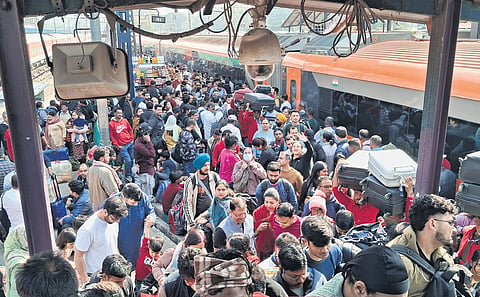

NEW DELHI: The evening rush at the New Delhi Railway Station felt different on Monday. There was unease in the air, a quiet tension that clung to every passenger stepping through the gates.
Just two nights ago, this place witnessed a deadly stampede, and now, it was a fortress under scrutiny. Passengers formed an impatient line at the entrance, their bags dragging along as security personnel and railway staff questioned them.
The queue stretched on for hundreds of metres, moving at a slow pace. Frustration brewed, and murmurs of discontent rose, especially about the unavailability of platform tickets. Many had arrived to see off their loved ones, only to be stopped at the gates.
In response to the tragedy, the Northern Railway has made platform tickets temporarily unavailable between 4 pm and 11 pm for the coming week. But the move, meant to control the crowds, left families stranded on the other side of the barricades waving helpless goodbyes from a distance. Inside, every movement was scrutinised.
Foot-overbridges, which witnessed the catastrophe, now had security personnel ensuring no one loitered. Anyone who stopped, even for a moment, faced questioning. Meanwhile, at the end of platforms, elderly and those with mobility issues struggled as they climbed the stairs with their luggage.
Officials shut down the elevators as a precautionary measure to manage the crowd. But for the aged and disabled, it seemed a harsh move as they were left with no choice but to rely on strangers for help.
Across the station, loudspeakers crackled with announcements instructing people where to sit and wait. Reserved passengers were ushered into waiting rooms, while those with sleeper and general tickets were directed to a separate waiting area near the platforms.
The strategy was to prevent unnecessary movement, but it also amplified the eerie silence that hung over the station. The security presence was overwhelming. Officers stood at every turn, their gazes unwavering. For many, this constant watch felt intimidating. There were hushed whispers among passengers.
Some expressed relief at the newfound discipline, others resented the strict measures. “If only this security had been here before, maybe that tragedy wouldn’t have happened,” a passenger muttered under his breath while he stole a nervous glance at an RPF jawan standing just a few feet away, ensuring his words didn’t reach the officer’s ears.
Trains bound for Prayagraj faced even stricter monitoring. The Maha Kumbh Mela is drawing to a close, and authorities were taking no chances.
A special holding area had been set up for pilgrims traveling with general tickets, with clear instructions of entering from Gate 12 and boarding from Platform 16. Meanwhile, passengers headed for Prayagraj were banned from using the Paharganj entry and were instead directed to the Ajmeri Gate side. A queuing system was now in place before train arrivals.
Passengers were expected to stand in designated lines, ensuring an orderly boarding process. Outside the station, a waiting zone had been created. It was a desperate attempt to maintain order, though many passengers looked around, uncertain about what lay ahead. The tragedy of two nights ago still lingered in the minds of those present.
Congress approaches NHRC for probe in stampede
Delhi Congress on Monday filed a complaint with the National Human Rights Commission (NHRC) seeking a probe into the stampede at New Delhi railway station where 18 people died and demanding action against the “erring officials”. Delhi Congress chief Devender Yadav alleged that the tragedy happened due to the irresponsibility of the railway authorities and security forces as they took no step to manage the swelling crowd despite the fact that a large number of passengers bound for Prayagraj to take a holi bath in the Maha Kumbh festival had assembled at the New Delhi station along with hundreds of passengers bound for other destinations by other trains.